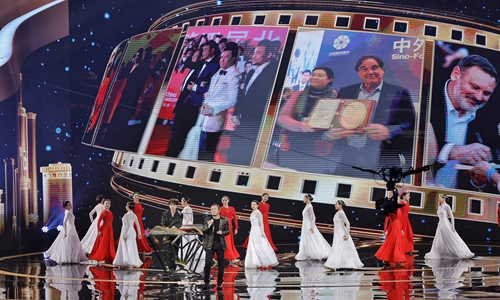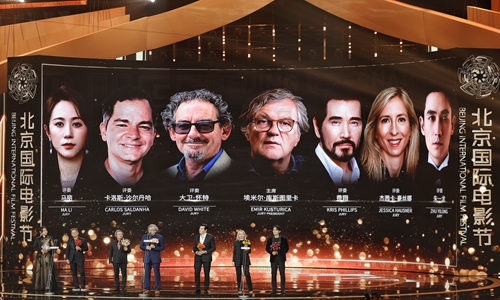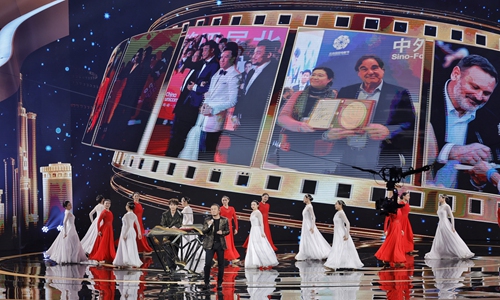
Artists on stage at the opening ceremony of the 14th Beijing International Film Festival in Beijing’s Huairou district on April 18 Photo: Li Hao/GT
The 14th Beijing International Film Festival (BJIFF) is underway. Buzzing with excitement and filled with diverse discussions, the festival has attracted a large cross-section of international filmmakers. Chinese moviegoers are flocking to the festival, eager to catch the screenings of their favorite films.
Qianqian (pseudonym), a movie enthusiast, told the Global Times that she has grabbed about 10 film tickets for various screenings. However, she lamented missing out on the 4K-restored version of
Peony Pavilion and US independent crime film
Pulp Fiction.
The top three fastest-selling films at the BJIFF, according to the committee, were Chinese films
May, the 4K-restored version of
Peony Pavilion, and
Like Winds, Like Weeds.
Tickets for foreign language films such as Japanese animated film
Perfect Blue,
Pulp Fiction, and dark comedy film
Dr. Strangelove were also snatched within seconds.
With over 200 activities planned, the BJIFF offers a colorful array of cultural activities, providing film enthusiasts with an enriching and entertaining experience.
Going global and IP innovative
BJIFF this year initially launched events such as the BJIFF International Lounge and Film Season for Diplomats, providing a platform for Chinese and foreign guests to discuss the paths for Chinese films to further go global. Participants emphasized the need for strategic support and meticulous planning to unlock the full potential of Chinese films on the international stage.
William Feng, Vice President of Asia Pacific, Motion Picture Association in the US, highlighted the interest of North American audiences in Chinese culture, citing the success of films like
Crouching Tiger, Hidden Dragon,
Hero, and
House of Flying Daggers. However, he noted a slight decline in interest, possibly due to viewer fatigue in certain kung fu genre.
He also suggested that Chinese films collaborate with streaming platforms for distribution. “Chinese film distribution should not be limited to theatrical distribution, as the user base of online platforms such as Netflix and Disney+ is very large. These online platform channels are excellent opportunities.”
Quentin Bohanna, International Sales Executive at Mk2 Films, emphasized the importance of international promotion for Chinese art films, particularly targeting markets like the US. He suggested strategies such as limited screenings followed by expansion based on audience response.
China has produced a lot of blockbusters in recent years, and related cultural products, as was the case with
The Wandering Earth II which also achieved remarkable success.
At a forum on international movie IP authority and franchise development, experts stated that in the category of derivative products, the key category segmentation model is adopted to accurately match the audience portraits of different popular IPs with market demand, accurately creating derivative products that meet audience needs, which can achieve both high-level collection and practical utilitarianism.
Ni Yuehong, former vice president of the Beijing Film Academy, told the Global Times that we also need to strengthen industrial cooperation, integrate advantageous resources, jointly promote the deep integration of the film derivative industry with the cultural and tourism industries, and create more influential cultural IPs.
Technological elements
The impact of AI on the global film and television industry has always been a hot topic.
Oscar-winning Australian sound editor David White told the Global Times that he holds an open and inclusive attitude and believes that current technology cannot threaten high-level Hollywood film production.
However, copyright issues involved in training models have always been controversial, and he hopes that regulations will be proposed by government bodies rather than private institutions in the future.
Hong Kong director Derek Tsang told the Global Times that AI would be a great help for filmmakers with low budgets and limited resources. However, he has also observed some new screenwriters using AI to write, which he considers to be a negative phenomenon as he firmly believes that human emotions and stories should come from humans, and emotions are something that AI cannot replace.
He stated that he would use AI as a tool for basic work but would invest his true emotions and feelings in the creation of scripts.
To incorporate technological elements into this year’s BJIFF, the 14th BJIFF also opened a panorama in the screen and technology section at the China Science and Technology Museum.
According to the committee, a total of 33 special effects films from 14 countries, including China, Russia, the US, and the UK were screened, along with 14 public welfare screenings of popular science documentaries, films highlighting the spirit of scientists, and short science fiction films, including popular Chinese science film
Seek Out Natural Mysteries. Director Wang Jie, who directed the film, told the Global Times that he hopes such events would inspire more people to engage with science and technology through cinema.
Cross-Straits exchange
During the 14th BJIFF ReelFocus Fresh Blood Short Film Program, Peggy Chiao, Jury President of the program and a film producer and professor from the island of Taiwan, expressed that she saw many young filmmakers with potential in this event.
She emphasized the shared cultural heritage between the Chinese mainland and the island of Taiwan, and called for increased collaboration to promote mutual understanding and unity.
Chiao told the Global Times that coming to the mainland is like coming home because her parents moved from the Chinese mainland to the island of Taiwan. She added that this emotional connection is very special to her. As a filmmaker, she uses films to know the story of her father’s generation.
Chiao expressed that the cultural roots of both sides of the Straits are the same, and cultural exchanges truly help deepen mutual recognition among people and foster a sense of true kinship.

Guests on stage at the opening ceremony of the 14th Beijing International Film Festival in Beijing’s Huairou district on April 18 Photo: Li Hao/GT

